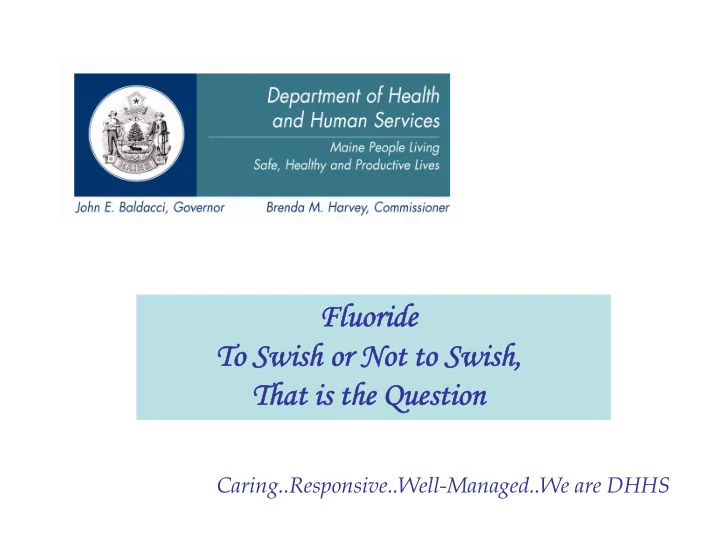

Fluoride Fluoride To Swish or Not to Swish, To Swish or Not to Swish, That is the Question That is the Question Caring..Responsive..Well-Managed..We are DHHS
This presentation w as developed by Karey A. Kershner, RDH, in collaboration w ith the Oral Health Program, Maine Center for Disease Control, Department of Health & Human Services, for use in school oral health education programs. Prepared during the 2007-2008 school year. For more information about this presentation, contact the Maine Oral Health Program at (207) 287-2361 (voice) (800) 606-0215 (TTY) 11 State House Station, 286 Water St. Augusta, ME 04333 Caring..Responsive..Well-Managed..We are DHHS
To Swish or To Swish or not to Swish, not to Swish, That is the question? That is the question?
• Fluoride is a naturally occurring compound that is found in groundwater. Fluoride is also naturally present in some foods and beverages, but the concentrations vary.
When a tooth has plaque on it and then you eat or drink something that has sugar in it, it causes acid to occur in your mouth. Acid eats through the enamel of your teeth by taking out the minerals ( this is called demineralization). Fluoride puts minerals back into the teeth to repair or remineralize early tooth decay.
Decay
• Fights decay • Breaks down bacteria • Remineralizes early decay areas that can appear as white lines along the gum line or around orthodontic appliances.
• A healthy mouth does not have cavities, tartar or plaque buildup. The gum tissue should be pink and without sores or infection. The tongue should also be pink and clear of plaque and sores.
Healthy teeth and gums
• Red puffy gums • Bleeds when brushed • Bleeds when flossed • Gums may feel itchy • Bad breath
• Plaque is a sticky substance that attaches to your tooth surface. It usually appears along the gum line (where the tooth meets the gum). This plaque contains bacteria. If the plaque is not removed with flossing and brushing, it causes an infection called Gingivitis and only “you” can get rid of this infection. Plaque also causes bad breath.
From Plaque to Gingivitis
• Brush at least 2 times per day • Brush in small circular motion on the teeth and along the gum line • Brush for 2-3 minutes • Floss at least 1 time per day, night time is best • Swish with fluoride rinse at least 1 time per day, night time is best, after flossing and brushing • Brush your tongue daily
Remember, Gingivitis is an infection. If you have plaque on your teeth, then you probably have gingivitis. The bacteria in plaque causes demineralization; this is the first stage of a cavity. It shows up in bright white lines along the gum line. Although with braces it also shows up around the brackets. When your braces are removed, you may have permanent white lines where your brackets used to be.
Pro’s Con’s Fights decay Need to wait 30 min. to eat or drink Helps with sensitivity Takes 1 minute per Breaks down bacteria week Saves parents $ Takes only 1 minute, 1 time per week Many different flavors
� They help you eat � Teeth help keep the shape of your face � They help you smile � Teeth help your speech � They help your self esteem � Teeth help you get and keep a job
• We have all heard how smoking hurts the inside of our body, but do you know what it can do to our mouth?? Cigarettes, cigars and chewing tobacco cause stain, cavities, abrasion, bad breath and mouth cancer. Using tobacco products also increases your risk of getting periodontal disease. The mouth is connected to the entire body and the body is connected to the mouth.
• When a person has a systemic disease like diabetes, it affects the mouth. Most people do not realize that the mouth can reflect what your body is going through and that the body can reflect what the mouth is going through.
• Periodontal disease is a condition in which the gums and bone that hold the teeth in place gets eaten by bacteria. If the bacteria is not treated, eventually the teeth become loose and need to be removed. This disease is an infection and infections should never go untreated.
• Think about how important your teeth are to you • Do you enjoy talking with someone who has bad breath • How do you feel when you meet or talk with someone that has rotting, black teeth or missing front teeth • Think of how you would feel if this was you
For more information about this presentation, contact the Maine Oral Health Program at (207) 287-2361 (voice) (800) 606-0215 (TTY) 11 State House Station, 286 Water St. Augusta, ME 04333 Caring..Responsive..Well-Managed..We are DHHS
Recommend
More recommend